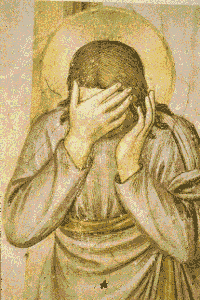
 |
Life After Death
|
SUMMARY.
 |
|
 |
Is there life after death? This is a question that everyone asks. Maybe not today…but we will inevitably ask it one day. Perhaps tomorrow, because of someone we know, or because of a friend who is dying. For us, also, the time will come.
| Jesus says: “As for the resurrection of the dead, have you never read what God himself said to you : 'I am the God of Abraham, the God of Isaac and the God of Jacob' God is God, not of the dead, but of the living.” (Gospel according to Saint Matthew, chapter 22 : 31 & 33) |
| "He has sought to please God, so God
has loved him; as he was living among sinners, he has been taken up… Coming to perfection in so short a while, he achieved long life; his soul being pleasing to the Lord, he has taken him quickly from the wickedness around him… But the virtuous live for ever, their recompense lies with the Lord." (Bible, Book of Wisdom, chapter 4, verses10 &13 and chapter 5, verse 15) |
| “For men, this is impossible; for God,
everything is possible.” (Gospel according to St. Matthew, chapter 19, verse 26)
“God wants everyone to be saved.”
"God loved the world so much that he gave his only Son, so that everyone
who believes in him may not be lost but have eternal life. |
1 - It is obvious to me that my inner life is not made to end. Nothingness repulses me. Somehow, my life, my being, must endure beyond death, in some other form of life. With the word, reincarnation, we are actually seeking eternity. But is the theory of reincarnation the right answer; is it the road leading to true happiness?
2 - People sense that they cannot go to Paradise the way they are. We are conscious of our need to be purified. One time or another were we not, to some degree, accomplices of evil in the world because of an evil act we engaged in?
(The concept that the soul moves from body to body reduces the body to being nothing more than a temporary prison. In fact, the body is the soul's ID card. The soul comes into existence with its body which gives it a form for living its spiritual life. We are a unique person with a unique soul, a unique body, a unique history and a unique eternity.)
(Gospel according to St. John, chapter 11, verses 25 & 26.)
| "You made us for Youself, Lord, and our
hearts are restless until they rest in you."
St. Augustine. |
| Father, accept this offering from your
whole family. Grant us peace in this life, same us from final damnation,
and count us among those you have chosen.
(Prayer at mass) |
| A short prayer to the Virgin Mary.
Hail Mary, full of grace! |
| "The Lord is not slow about his promise...
not wishing that any should perish, but that all should reach repentance."
(Second letter of Peter, chapter 3, verse 9.) |
| "Here God lives among men. He will make
his home among them; they shall be his people, and he will be their God;
his name is God-with-them. He will wipe away all tears from their eyes; there will be no more death, and no more mourning or sadness. The world of the past has gone." (The Book of Revelation, chapter 21, verses 3 & 4.) |
By Father Yves de Boisredon
and
Herve-Marie Catta